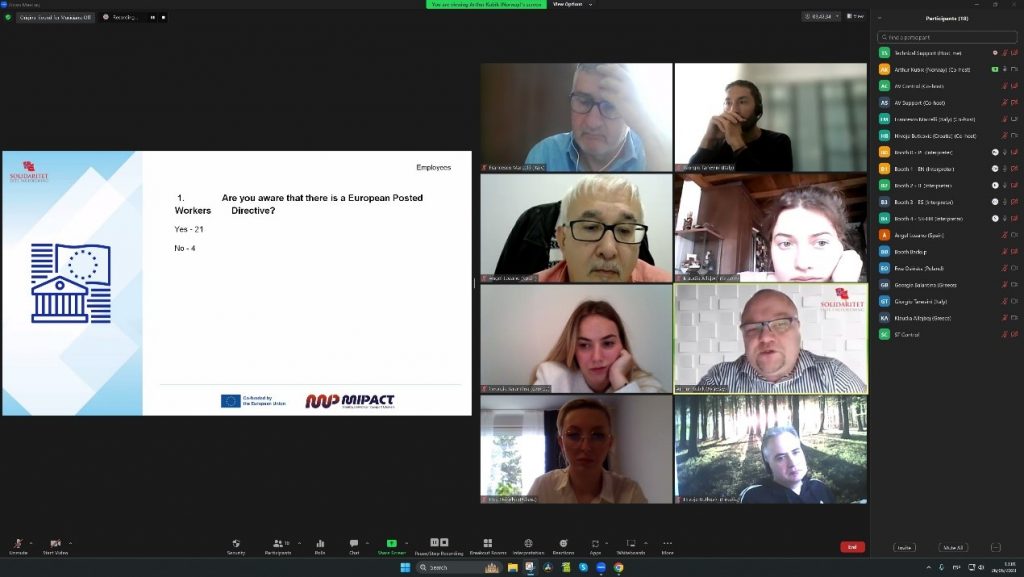NEWS
Expert meeting 26.05.2023
The expert meeting, held online on May 26, 2023, was organized by the beneficiary organization FAST and covered various aspects related to European worker posting. Here’s a summary of the key findings and discussions:
Federazione Autonoma dei Sindacati di Trasporti (FAST), Italy
- Surveyed workers were primarily aged 35-54, male, and had an intermediate degree.
- About 60% were unaware of European regulations, and only 20% believed these regulations guaranteed employment conditions.
- 70% received information from their company, but 33% found it inadequate.
- 60% said their remuneration was set by agreement, with base salary, seniority, and agreement supplement being mandatory components.
- 94% received annual health check-ups, but 31% felt their safety training was inadequate.
- Key problems identified included lack of information, interpretation issues, and non-application of regulations.
- Workers usually sought solutions through unions (65%).
Central European Chamber of Commerce, Poland
- Workers and employers had varying levels of awareness about European regulations.
- 45% of workers did not have Information and Consultation (I and C) systems in their companies.
- Employers were more informed about regulations but believed they didn’t apply to their sector.
- Most employers (60%) provided travel allowances.
- Problems included lack of information and interpretation issues.
Institute for Development and Industrial Relations, Croatia
- Both workers and employers lacked knowledge about European and national regulations.
- Most workers were unaware of I and C processes.
- The majority believed salaries were regulated by agreement.
- Workers expressed a need for better consultation and improved employment conditions.
- Employers had limited knowledge of regulations and required documents.
- Workers turned to unions or employers for problem resolution.
Antonio Bustamante Foundation, Spain
- Spain had a high rate of worker displacement, but European legislation was incorporated into national law.
- Participation systems included company committees and unions.
- 73% of employers knew about regulations and online tools.
- Workers and employers differed in their views on the effectiveness of European regulations.
- Salaries were commonly based on collective agreements.
- Employers and workers agreed on the need for better information.
Panepistimio Thessaly and Center for Education and Innovation, Greece
- Lack of information was a common problem for both workers and employers.
- Workers typically approached unions to resolve issues.
- Remuneration was often regulated by collective agreements.
- Many respondents did not receive medical examinations or health and safety training.
Solidaritet Norge, Norway
- Workers had a better understanding of European regulations than employers.
- Both workers and employers believed regulations applied but had mixed opinions on their effectiveness.
- Employers acknowledged using I and C systems.
- Workers sought solutions through unions.
- Needs included improved remuneration and health and safety attention.
The expert meeting provided valuable insights into the state of worker posting in various European countries, highlighting the need for better information, clearer regulations, and improved working conditions. The discrepancies between workers’ and employers’ perceptions underscored the importance of communication and collaboration in addressing these issues. Future project activities were also discussed during the meeting.

Funded by the European Union. Views and opinions expressed are however those of the author(s) only and do not necessarily reflect those of the European Union. Neither the European Union nor the granting authority can be held responsible for them.
